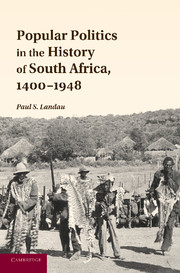Book contents
- Frontmatter
- Contents
- List of Figures
- Preface: The Birth of the Political
- Acknowledgments
- 1 Eyewitness Engagements (Highveld political discourse at the start of the 1800s)
- 2 History before Tribes (Partnership, alliance, and power)
- 3 Translations (Missionaries and the invention of Christianity)
- 4 The Incipient Order (Moroka's reign, 1828–1880)
- 5 Mixed People (The Samuelites, the Griqua, and other subjectivities, 1880–1928)
- 6 Twentieth-Century Tribes
- Primary and Archival Sources
- Bibliography
- Index
Preface: The Birth of the Political
Published online by Cambridge University Press: 04 August 2010
- Frontmatter
- Contents
- List of Figures
- Preface: The Birth of the Political
- Acknowledgments
- 1 Eyewitness Engagements (Highveld political discourse at the start of the 1800s)
- 2 History before Tribes (Partnership, alliance, and power)
- 3 Translations (Missionaries and the invention of Christianity)
- 4 The Incipient Order (Moroka's reign, 1828–1880)
- 5 Mixed People (The Samuelites, the Griqua, and other subjectivities, 1880–1928)
- 6 Twentieth-Century Tribes
- Primary and Archival Sources
- Bibliography
- Index
Summary
This book weaves together several stories about popular politics in South Africa in the course of making the argument that those politics have been largely misconstrued. It begins, for all intents and purposes, with Chapter 1. Here, briefly, are a few of its most basic assertions for those who would like a preview. First, the case is made that the people of South Africa were historically well equipped to embrace and absorb strangers. Hybridity lay at the core of their subcontinental political traditions. Nineteenth-century European newcomers were different and attempted to repudiate mixing, politically and otherwise, albeit with only partial success. It was they who characterized, or mis-characterized, Africans as perennial tribesmen. Second, the book is about what happened to popular politics in the course of the nineteenth and early twentieth centuries. South African modes of self-rule comprised a venerable political tradition, one that deprecated skin color and language as barriers and elevated brotherhoods, rankings, and amalgamations. The tradition preceded tribes and survived through them and beyond them. Ultimately it fed into the politics of the twentieth century, informing South Africa's growing independent Christian churches, other hard-to-catalogue popular movements, rural resistance, and eventually, even the nationalism of the African National Congress.
Popular Politics in the History of South Africa, 1400–1948, offers a revised view of what happened to people's efforts to mobilize themselves in their own interest through much of the colonial era. Therefore it is also an explanation for previous representations of Africans and brown-skinned people.
- Type
- Chapter
- Information
- Popular Politics in the History of South Africa, 1400–1948 , pp. xi - xivPublisher: Cambridge University PressPrint publication year: 2010

